#3 Principles
Explore tagged Tumblr posts
Text

Only at Three Principles Australia can you find the best and most practical three principles coaching services that will help you find meaning in your life and make the necessary adjustments to realize your goals. Dive deeper into how you can truly manage your life, visit our website now!
0 notes
Text
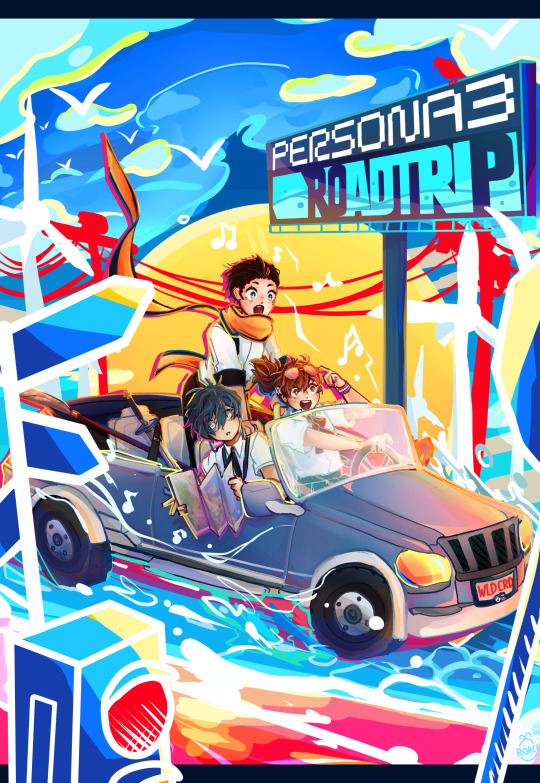

POV u weren't invited to the P4 Ultimax grand prix
Bonus:

#persona 3#persona 3 reload#persona 3 portable#p3#fanart#ryoji mochizuki#kotone shiomi#hamuko arisato#minato arisato#“roach shouldn't you tag makoto yuuki for reach” Its about Principles.#Roadtrip Trio#Freed from the binds of atlus at least#This is what they're doing in the canon timeline while everyones doing fuck all#aigis#aigis persona 3#narukami yu#hamugis
2K notes
·
View notes
Text

Chapter 4: I know you.
The Elite Guard arrives on Earth and slowly everything becomes known- As well as the reason Sentinel is acting so odd.
#my art#fanart#fanfic#Transformers#Maccadam#Tfa#Bumblebee#Wasp#Soundwave#Ratbat#Sentinel Prime#Shockwave#IN THE MIDDLE OF THIS I THOUGHT I'D CRASH BUT SOMEHOW I MADE IT THROUGH IT#Evil shockdad au#I also had cool ideas for this chapter's artwork however all of it included perspective and I just Couldn't Make It Work so#Following the Keep It Simple Stupid principle to not go insane <3#transformers animated#fic: Calculated Love
267 notes
·
View notes
Text
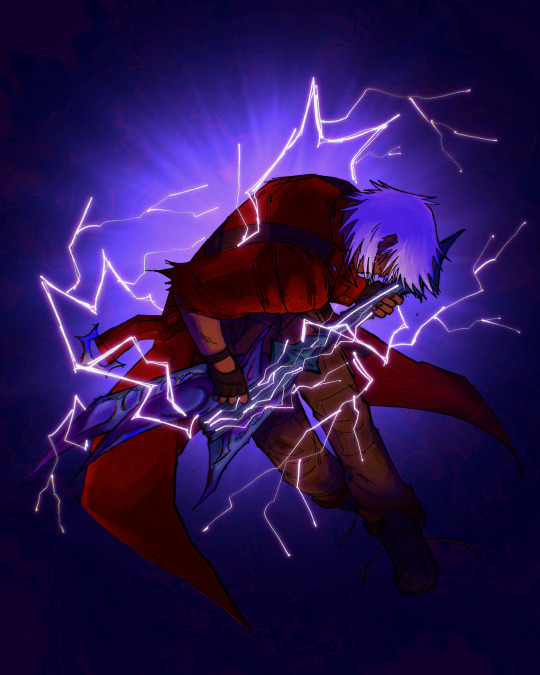
ANYONE CAN PLAY GUITAR
#this song has been stuck in my head and has become a Dante song to me just on like. Principle#Any song can become a character song if you're thinking about them hard enough while listening to it#id in alt text#my art#devil may cry#devil may cry 3#dmc#dmc3#dmc3 dante#dante sparda#dante dmc
255 notes
·
View notes
Text
So I accidentally almost got into an argument on Twitter, and now I'm thinking about bad historical costuming tropes. Specifically, Action Hero Leather Pants.
See, I was light-heartedly pointing out the inaccuracies of the costumes in Black Sails, and someone came out of the woodwork to defend the show. The misunderstanding was that they thought I was dismissing the show just for its costumes, which I wasn't - I was simply pointing out that it can't entirely care about material history (meaning specifically physical objects/culture) if it treats its clothes like that.
But this person was slightly offended on behalf of their show - especially, quote, "And from a fan of OFMD, no less!" Which got me thinking - it's true! I can abide a lot more historical costuming inaccuracy from Our Flag than I can Black Sails or Vikings. And I don't think it's just because one has my blorbos in it. But really, when it comes down to it...
What is the difference between this and this?
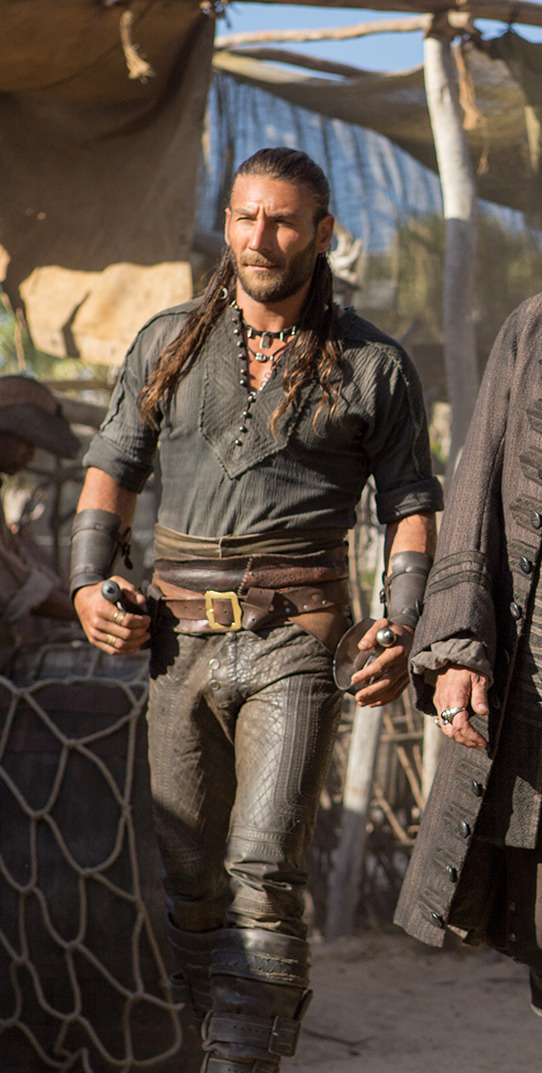
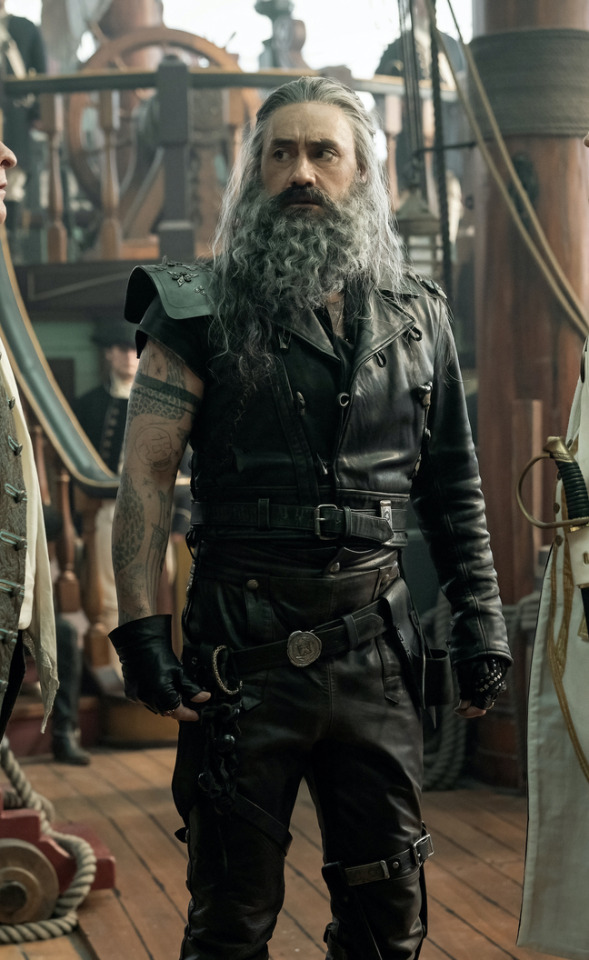
Here's the thing. Leather pants in period dramas isn't new. You've got your Vikings, Tudors, Outlander, Pirates of the Caribbean, Once Upon a Time, Will, The Musketeers, even Shakespeare in Love - they love to shove people in leather and call it a day. But where does this come from?
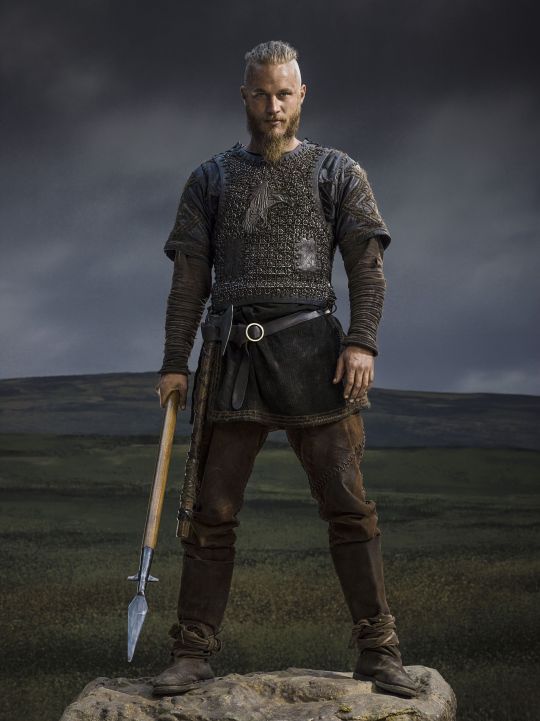
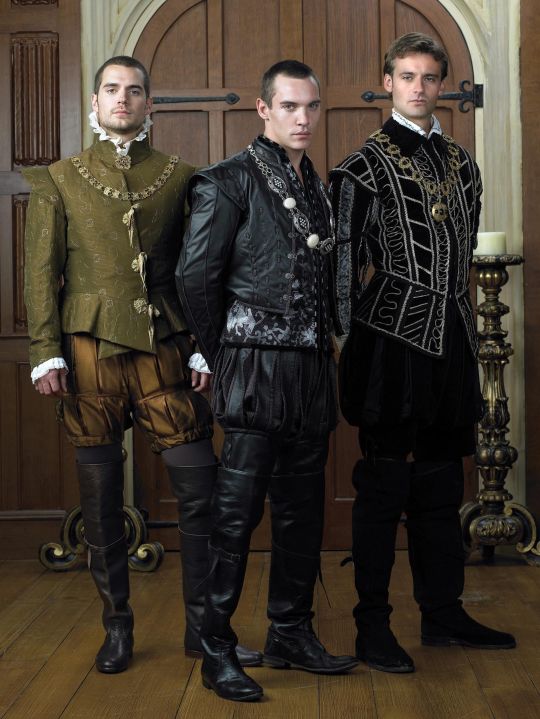
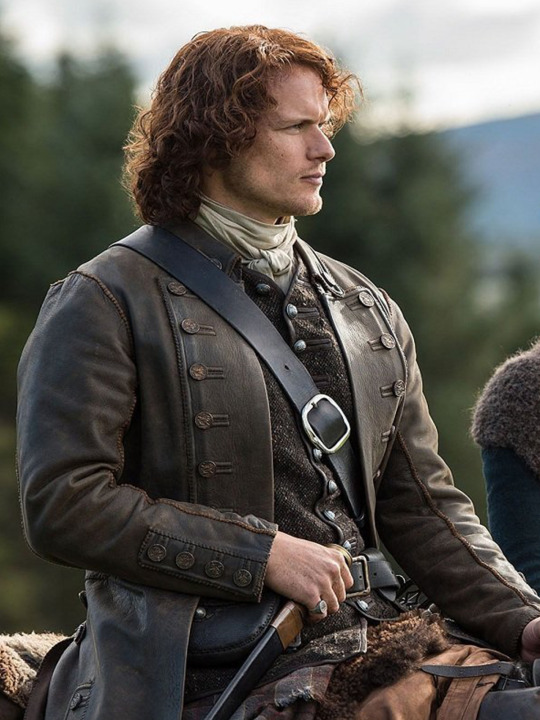

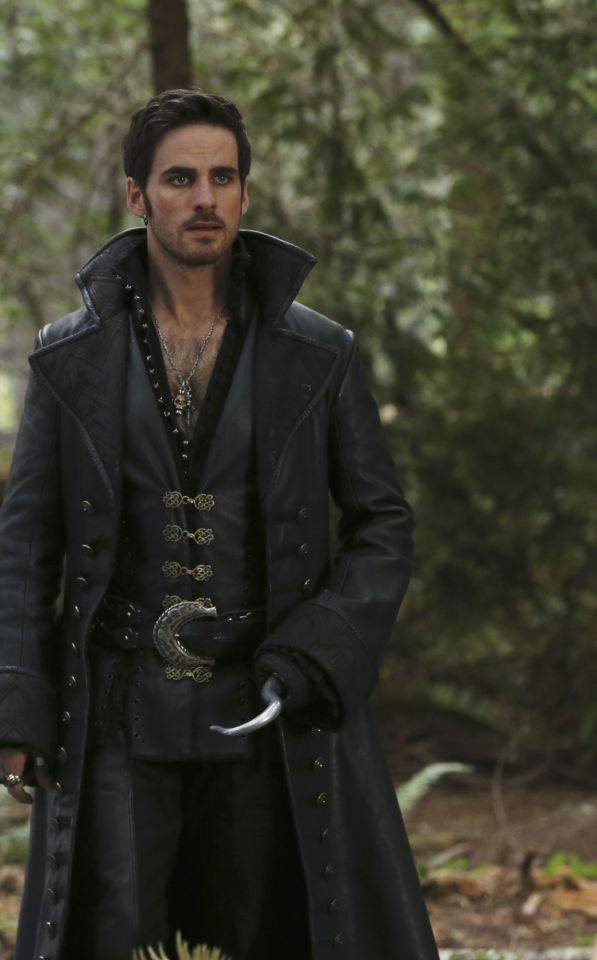
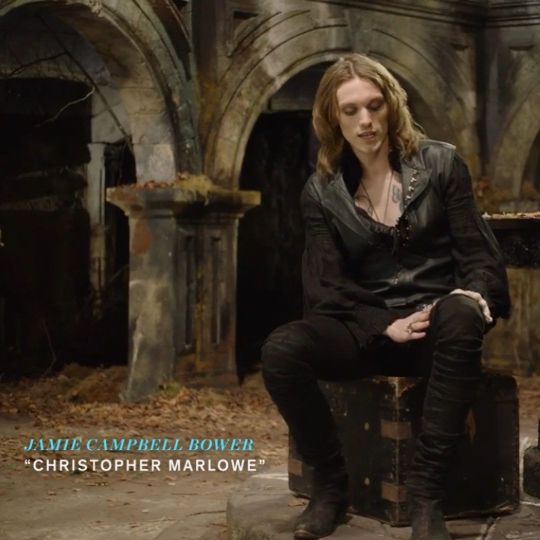
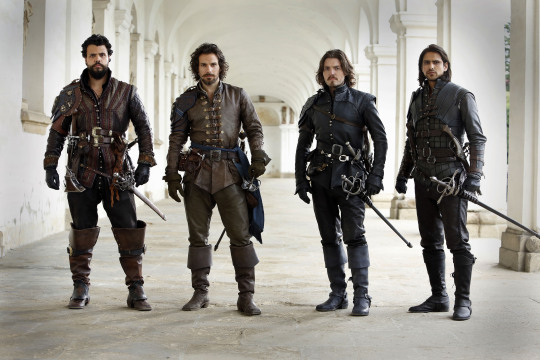
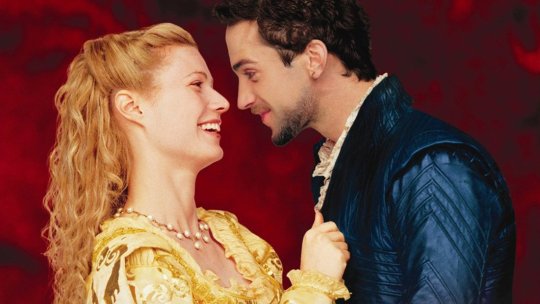
Obviously we have the modern connotations. Modern leather clothes developed in a few subcultures: cowboys drew on Native American clothing. (Allegedly. This is a little beyond my purview, I haven't seen any solid evidence, and it sounds like the kind of fact that people repeat a lot but is based on an assumption. I wouldn't know, though.) Leather was used in some WWI and II uniforms.
But the big boom came in the mid-C20th in motorcycle, punk/goth, and gay subcultures, all intertwined with each other and the above. Motorcyclists wear leather as practical protective gear, and it gets picked up by rock and punk artists as a symbol of counterculture, and transferred to movie designs. It gets wrapped up in gay and kink communities, with even more countercultural and taboo meanings. By the late C20th, leather has entered mainstream fashion, but it still carries those references to goths, punks, BDSM, and motorbike gangs, to James Dean, Marlon Brando, and Mick Jagger. This is whence we get our Spikes and Dave Listers in 1980s/90s media, bad boys and working-class punks.
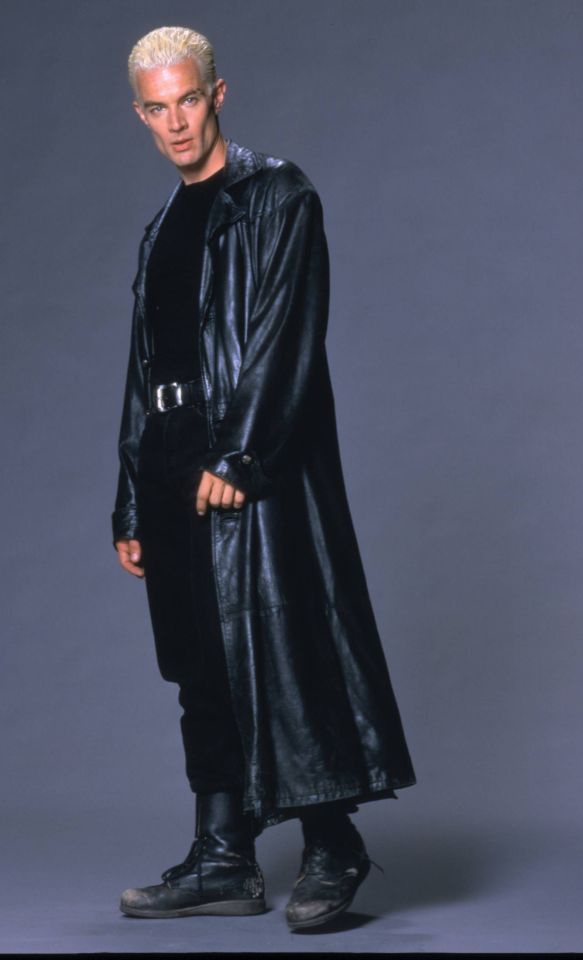
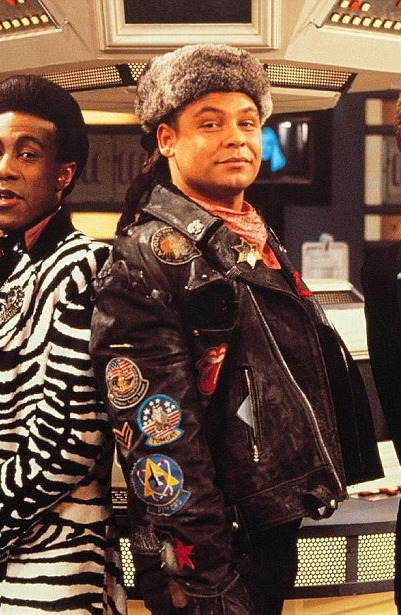
And some of the above "historical" design choices clearly build on these meanings. William Shakespeare is dressed in a black leather doublet to evoke the swaggering bad boy artist heartthrob, probably down on his luck. So is Kit Marlowe.
But the associations get a little fuzzier after that. Hook, with his eyeliner and jewellery, sure. King Henry, yeah, I see it. It's hideously ahistorical, but sure. But what about Jamie and Will and Ragnar, in their browns and shabby, battle-ready chic? Well, here we get the other strain of Bad Period Drama Leather.
See, designers like to point to history, but it's just not true. Leather armour, especially in the western/European world, is very, very rare, and not just because it decays faster than metal. (Yes, even in ancient Greece/Rome, despite many articles claiming that as the start of the leather armour trend!) It simply wasn't used a lot, because it's frankly useless at defending the body compared to metal. Leather was used as a backing for some splint armour pieces, and for belts, sheathes, and buckles, but it simply wasn't worn like the costumes above. It's heavy, uncomfortable, and hard to repair - it's simply not practical for a garment when you have perfectly comfortable, insulating, and widely available linen, wool, and cotton!
As far as I can see, the real influence on leather in period dramas is fantasy. Fantasy media has proliferated the idea of leather armour as the lightweight choice for rangers, elves, and rogues, a natural, quiet, flexible material, less flashy or restrictive than metal. And it is cheaper for a costume department to make, and easier for an actor to wear on set. It's in Dungeons and Dragons and Lord of the Rings, King Arthur, Runescape, and World of Warcraft.
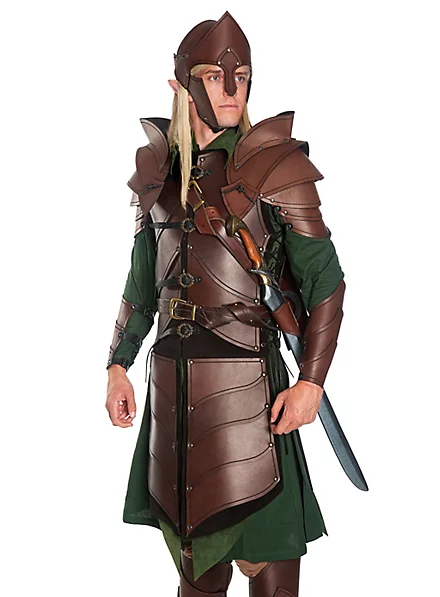
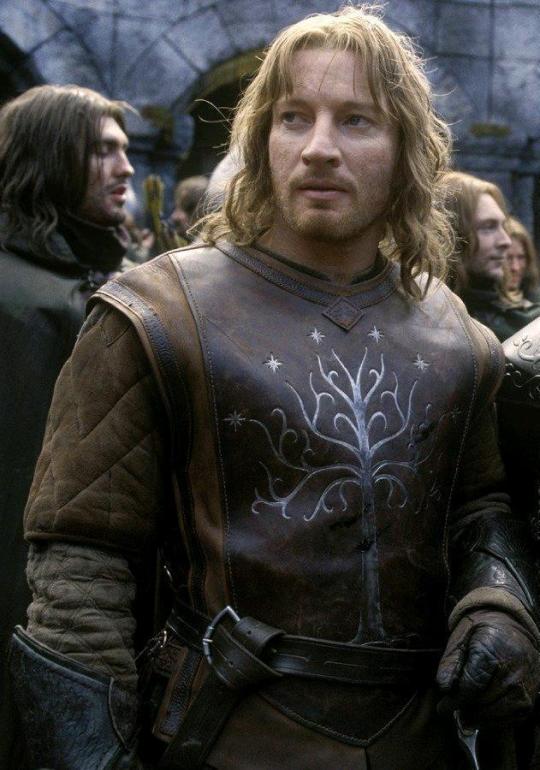
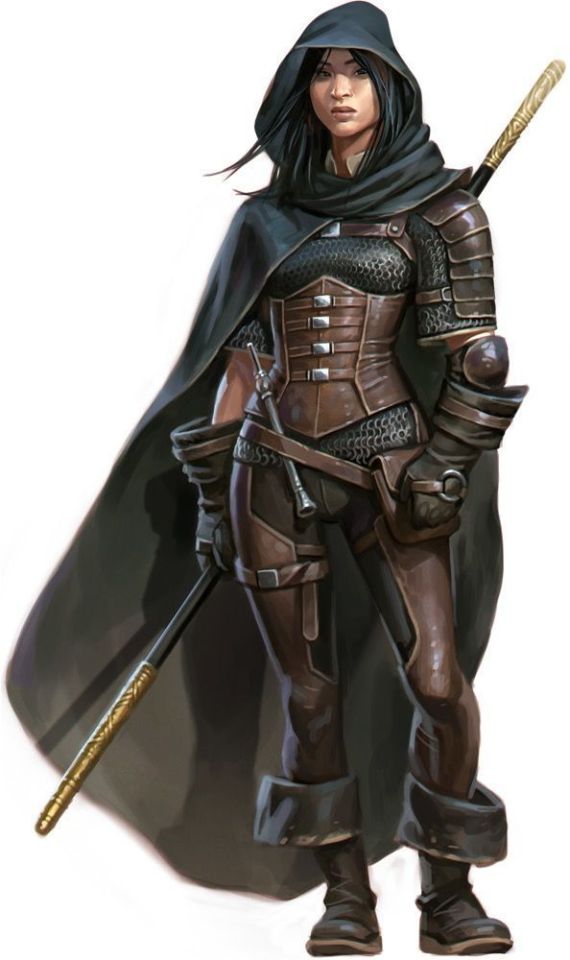
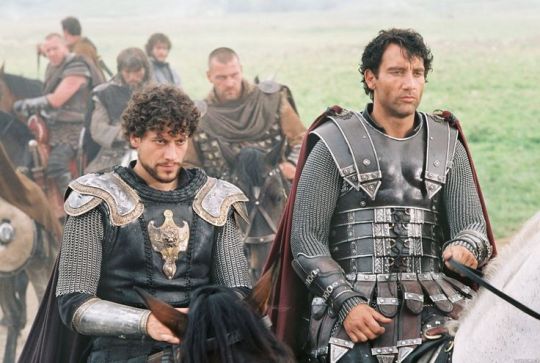

And I think this is how we get to characters like Ragnar and Vane. This idea of leather as practical gear and light armour, it's fantasy, but it has this lineage, behind which sits cowboy chaps and bomber/flight jackets. It's usually brown compared to the punk bad boy's black, less shiny, and more often piecemeal or decorated. In fact, there's a great distinction between the two Period Leather Modes within the same piece of media: Robin Hood (2006)! Compare the brooding, fascist-coded villain Guy of Gisborne with the shabby, bow-wielding, forest-dwelling Robin:
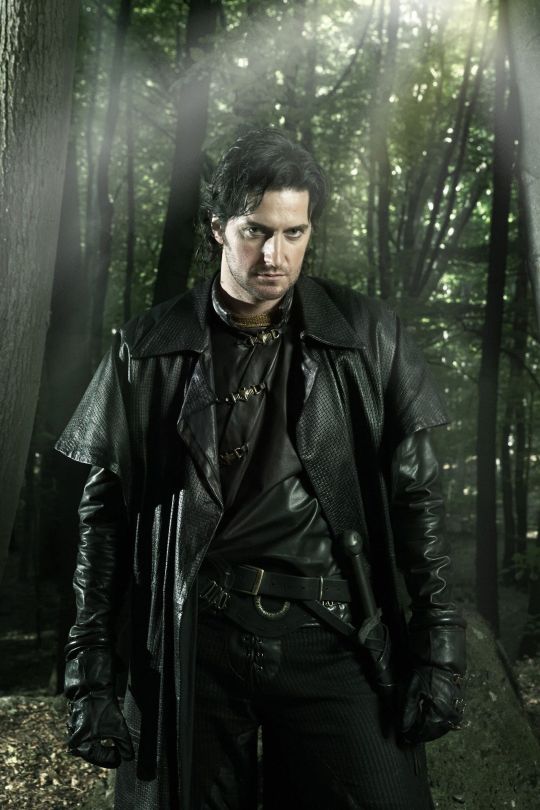
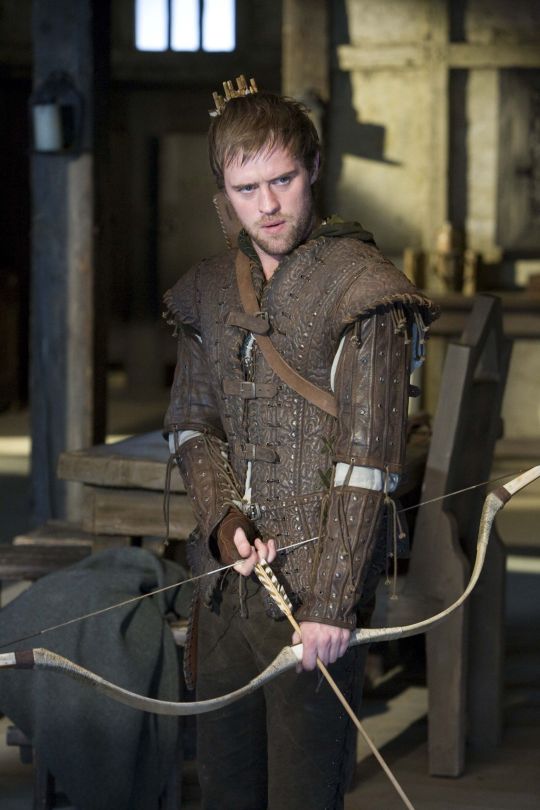
So, back to the original question: What's the difference between Charles Vane in Black Sails, and Edward Teach in Our Flag Means Death?
Simply put, it's intention. There is nothing intentional about Vane's leather in Black Sails. It's not the only leather in the show, and it only says what all shabby period leather says, relying on the same tropes as fantasy armour: he's a bad boy and a fighter in workaday leather, poor, flexible, and practical. None of these connotations are based in reality or history, and they've been done countless times before. It's boring design, neither historically accurate nor particularly creative, but much the same as all the other shabby chic fighters on our screens. He has a broad lineage in Lord of the Rings and Pirates of the Caribbean and such, but that's it.
In Our Flag, however, the lineage is much, much more intentional. Ed is a direct homage to Mad Max, the costuming in which is both practical (Max is an ex-cop and road warrior), and draws on punk and kink designs to evoke a counterculture gone mad to the point of social breakdown, exploiting the thrill of the taboo to frighten and titillate the audience.
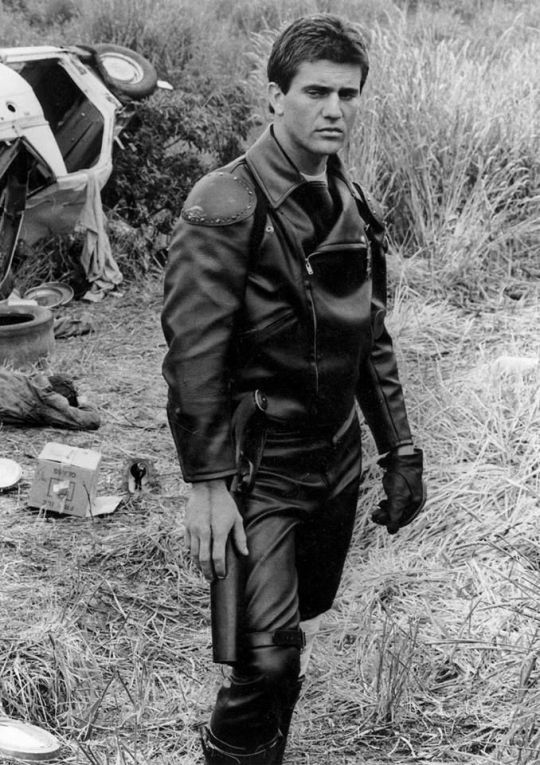
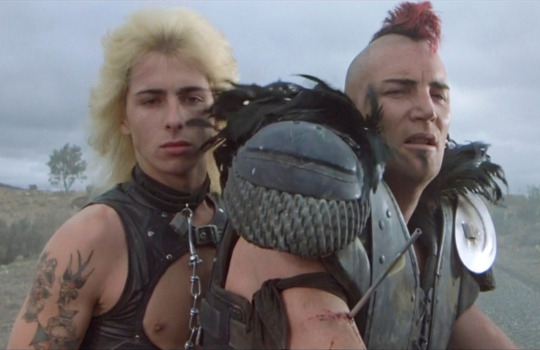
In particular, Ed is styled after Max in the second movie, having lost his family, been badly injured, and watched the world turn into an apocalypse. He's a broken man, withdrawn, violent, and deliberately cutting himself off from others to avoid getting hurt again. The plot of Mad Max 2 is him learning to open up and help others, making himself vulnerable to more loss, but more human in the process.
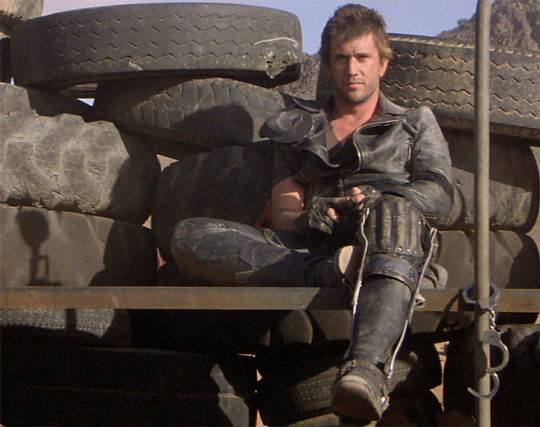
This ties directly into the themes of Our Flag - it's a deliberate intertext. Ed's emotional journey is also one from isolation and pain to vulnerability, community, and love. Mad Max (intentionally and unintentionally) explores themes of masculinity, violence, and power, while Max has become simplified in the popular imagination as a stoic, badass action hero rather than the more complex character he is, struggling with loss and humanity. Similarly, Our Flag explores masculinity, both textually (Stede is trying to build a less abusive pirate culture) and metatextually (the show champions complex, banal, and tender masculinities, especially when we're used to only seeing pirates in either gritty action movies or childish comedies).
Our Flag also draws on the specific countercultures of motorcycles, rockers, and gay/BDSM culture in its design and themes. Naturally, in such a queer show, one can't help but make the connection between leather pirates and leather daddies, and the design certainly nods at this, with its vests and studs. I always think about this guy, with his flat cap so reminiscient of gay leather fashions.
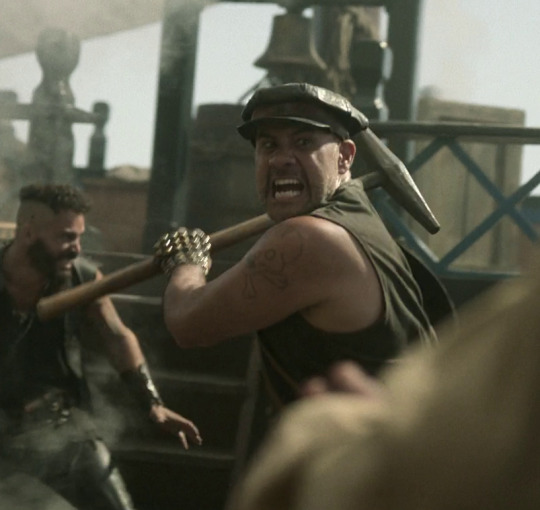
More overtly, though, Blackbeard and his crew are styled as both violent gangsters and countercultural rockstars. They rove the seas like a bikie gang, free and violent, and are seen as icons, bad boys and celebrities. Other pirates revere Blackbeard and wish they could be on his crew, while civilians are awed by his reputation, desperate for juicy, gory details.
This isn't all of why I like the costuming in Our Flag Means Death (especially season 1). Stede's outfits are by no means accurate, but they're a lot more accurate than most pirate media, and they're bright and colourful, with accurate and delightful silks, lace, velvets, and brocades, and lovely, puffy skirts on his jackets. Many of the Revenge crew wear recognisable sailor's trousers, and practical but bright, varied gear that easily conveys personality and flair. There is a surprising dedication to little details, like changing Ed's trousers to fall-fronts for a historical feel, Izzy's puffy sleeves, the handmade fringe on Lucius's red jacket, or the increasing absurdity of navy uniform cuffs between Nigel and Chauncey.
A really big one is the fact that they don't shy away from historical footwear! In almost every example above, we see the period drama's obsession with putting men in skinny jeans and bucket-top boots, but not only does Stede wear his little red-heeled shoes with stockings, but most of his crew, and the ordinary people of Barbados, wear low boots or pumps, and even rough, masculine characters like Pete wear knee breeches and bright colours. It's inaccurate, but at least it's a new kind of inaccuracy, that builds much more on actual historical fashions, and eschews the shortcuts of other, grittier period dramas in favour of colour and personality.
But also. At least it fucking says something with its leather.
#everyone say 'thank you togas' for not including a long tangent about evil rimmer in red dwarf 5x05#Our Flag Means Death#Togas does meta#and yes these principles DO fall apart slightly in s2 and i DON'T like those costumes as much#don't get me wrong they're fun and gorgeous - but generally a bit less deep and more inaccurate. so. :(#I'm not sure this really says anything new about Our Flag but I just needed to get my thoughts out#i hate hate hate Gritty Period Drama costumes they're so boring and so ugly and so wrong#god bless OFMD for using more than 3 muted colours and actually putting men in heels (and not as a shorthand for rich/foppish villainy) <3#looking at that Tudors still is insane like they really will go to any lengths to not make men feel like they've got bare legs XD#image descriptions in alt text#and yes i DID just sink about two hours into those so you'd better appreciate them
1K notes
·
View notes
Text
imagining this very funny totally amusing bit where dust (despite having a lot of pockets) makes horror carry a lighter for him (only because he can't be bothered to remember to bring one on him all the time) and horror keeps it in his head
but horror's a dick so everytime dust wants to smoke and he needs a light horror's always like "whats the password :3" (he actually said the emoticon i was the quotation marks) and dust has to guess. because horror changes it every time. and its never something predictable. and then he either just totally gives up on that cig or he has to forcefully dig into horror's head to get the lighter because horror's being a PRICK
now dust is shoulder deep into horror's eyesocket while horror is clawing and screaming and killer's just standing there behind them watching this unfold with that fuckass smile on his face (he can't get this type of entertainment anywhere else)
#bonus: this means that horror could theoretically breathe fire#like the world's shittiest magician!!!! he would need a shitton of fuel tho to get a big flame#peak mtt interactions i believe. knowledge of canon is only to make more ridiculous scenarios realistic#killer worlds best bystander to dust and horror's bullshit. he sees something he says NOTHING#erm well technically! the eye goop would get in the way of his vision so he actually doesn't see anything either! alright wrap it up pal#i COULD make this into a comic but i simply have larger priorities rn i cant (tweaking out over hw still)#horror if you were just less of a bitch maybe you wouldnt be in this situation#but it's the matter of the principle he says. dust has to guess the password he says. well who's complaining when dust is in your skull huh#this too counts as horrordust beefing. because you'd think that horror would just give the lighter to dust#but unfortunately this was posted by me (triglycercule) and i will have no such thing as bear horror on this account#dust would wear cargo shorts he would wear a cargo vest he'd have a belt with pockets he'd have secret shoe pockets he IS a pocket#why wouldnt dust just keep the lighter on him!!! CMON he's mellowed out since his dusttale days!! the human is dead so now he can be lazier#not lazy enough that he can couch rot for 3 weeks straight (he needs to stay SOMEWHAT active (force of habit))#but lazy enough where if he has a living purse then he will use said purse for its pursing purpose#horror's head doesnt even have enough space for dust to fit his arm in wtf. improper use of eye socket ahh 😭😭#tricule rant#killer sans#dust sans#horror sans#murder time trio#utmv#sans au#THEYRE SO SILLY MTT MY SILLY GOOFS!!!! a rare moment where they beef but it has nothing to do with their lore/backstories
151 notes
·
View notes
Text
astarion's disapproval is so fucking funny sometimes I just told isobel she's about to get kidnapped and he's the only person in my party who got huffy about this decision. Including shadowheart who has been looming over my tav's shoulder like an angry goth pufferfish this entire interaction.
like. excuse me for protecting the one person in a 50 mile radius who's making sure everyone's skin, INCLUDING YOURS, doesn't flake off from necrotic damage like a desiccated corn husk. My audacity truly knows no bounds.
#thought it would be shadowheart who had issues with this but nope it's the feral cat man#babygirl what is your problem here#do you just hate honesty on principle? is that it you unholy terror?#astarion#astarion ancunin#shadowheart#bg3#baldur's gate 3#bg3 spoilers#just in case#spoilers
915 notes
·
View notes
Text
Y'know, it occurs to me - Movie!Sonic has a lot more in common Shadow than any other version of Sonic that I know of, and that creates a unique storytelling opportunity that wouldn't have been possible before.
Because originally, Shadow having a dark and traumatic backstory was what separated him from Sonic. Their similarities came out more in their confidence, their playful attitude, and even their withdrawn demeanor (though Shadow's is more extreme). Sonic's genuine ability to be carefree and optimistic was his biggest difference from Shadow.
In the movies, Sonic is... not nearly as put-together. Just like Shadow, his personality is shaped almost entirely from the result of tragedy. Both of them had to watch their closest family member get shot trying to save them from raiders (who were specifically targeting them for their powers) by sending them to Earth. The difference here is that, for Shadow, this event is fresh in his mind, while Sonic's had ten years (give or take) to accept what happened and move on.
Except, there's more, because losing Longclaw is itself not the main thing informing Sonic's character - it's the fact that he spent those next ten years in near-total isolation. Also similarly to Shadow, he took the last words his family said to him very seriously, and she told him to stay hidden no matter what. Combine that with the natural fear of what being found did to Longclaw, and the majority of Sonic's life has been spent hidden away, looking out at the world but unable to participate in it.
Remind you of anyone?

(I swear if the movie doesn't make a point about this parallel specifically I'm gonna lose it)
Normally, Sonic is a silly and upbeat character because that's just how he is by nature, and the feelings he keeps to himself are rarely detrimental to his health. In the movie universe, Sonic is silly and upbeat because he needed to be that way in order for his life to be bearable.
His constant chatter isn't quirky for the sake of it, it's a habit he developed out of necessity because there was no one else to talk to. He compulsively needs to fill the silence because not doing that would only reinforce how alone he was, and it's something he can't shake off even when he's not by himself anymore. His primary method of handling his feelings is to ignore them until they literally explode out of him with lightning firing everywhere.
All of this to say, a Shadow meant to be a foil to this Sonic is going to look very different from the Shadow we're used to. From what little about the movie's events have been described as of writing this, I'm inferring that Shadow's actually going to be a lot more open about his motivations for revenge than he was in the game, and that puts Sonic in the very interesting position of being more closed-off than Shadow.
Because sure, he might try to connect with Shadow's pain like he did with Knuckles. But because Sonic and Knuckles's history was so directly connected, they didn't really have to... talk that much about it. Sonic could acknowledge that they both lost their families a long time ago without having to go into detail about it or the aftermath. And because it had been so long since it happened, it was a lot easier for them to put it behind them and move on.
Shadow can't do that, because for him, Maria was lost very recently. He's not going to accept "you can move on and find new people to care about" as an option, and Sonic can't very well tell him to just ignore it like he did, either. Shadow isn't going to do the whole repression shtick.
For the first time, getting through to Shadow may just depend on Sonic being able to acknowledge his own pain, first. After all, how's Shadow supposed to interpret Sonic, if not as some random guy with a perfectly happy family and an obnoxiously happy attitude telling him that he needs to just, get over what happened to him? How can that come across as anything but naive and shallow without understanding how much Sonic suffered to get to this point?
(It's still a little naive and shallow even with that in mind, but the reason for that isn't because he has no perspective on what experiencing a violent tragedy is like - it's because his only known way of handling it is to leave it in the past and Not Think About It)
Though I do wonder if there's room for Sonic to initially clam up on his emotions even more after meeting Shadow for a bit? Like, he learns to some extent what happened, and is like "aw jeez if this is what could happen if I let myself be more upset about my lot in life then I REALLY need to reign it in" which is the exact opposite lesson he needs to learn but would be really interesting to watch
Point being, I think Sonic and Shadow are being set up as even more like mirrors to each other than usual, and I can't wait to see what they do with that potential
#sonic the hedgehog#shadow the hedgehog#sonic movie#sonic wachowski#movie!shadow#sonic movie 3#analysis#meta#On principle I'm not a fan of Shadow being written to be more open and therefore less subtle#BUT I do see the potential for it working really well in conjunction with this Sonic specifically
290 notes
·
View notes
Text
Just the other day someone said I must hate Cecil because I pointed out he's the type of man who not only constantly ignores the boundaries Mark has set but also the type to say one thing to Mark's face and then do shit behind his back. And lo and behold, what do we have but Conquest, alive in his motherfucking basement, after Mark, Eve, AND Oliver gave every inch of their life to take that bastard down. You truly cannot make this shit up.
#like it gets to a point it really does#i'd bet top bottom dollar cecil would recruit armstrong if he could#then i'd see if y'all would think mark is just some naive hardheaded teenager#who doesn't understand how the world works#like it's not even about morals at this point#it's the principle of it#cecil just proved clear as day why mark can never trust#or work for him ever again#mark grayson#cecil stedman#eve wilkins#invincible#invincible season 3#invincible season 3 finale
56 notes
·
View notes
Text
Rocking back and forth thinking about Wyll's response to Ascended vs. Spawn Astarion returning to Baldur's Gate......
Astarion: (Ascended) I know these cobbles well. The gate to the Upper City's just ahead. I found plenty of victims on the other side of that gate. Who knew they'd all come in so useful?
Wyll: (pissed) Gods, how many did you kill? Dozens? Hundreds??!
Alternatively,
Astarion: (Spawn) All that time and what's my legacy in Baldur's Gate..? Missing friends and broken families.
Wyll: (gently) You can't undo the past, Astarion. But you can craft a better future, if you so choose.
#if you try to be better he is 100000% in your corner. your greatest hype man#but his principles won't let him go down too dark a path or associate with anyone who does#he believes in you. he knows you can be better#and he'll be with you all the way if you decide you want to do better#he doesn't hold anyone's past against them UNLESS they are determined not to change. to keep victimizing other people#i'm obsessed with him your honor#wyll ravengard#astarion ancunin#wyllstarion#bloodpact#baldur's gate 3
641 notes
·
View notes
Text
Become a three principles practitioner with Threeprinciplesaustralia.com! We have the best three principles coach training solutions for you to choose from to boost your inner confidence and prepare you to make an impact in your professional life. Please visit our website right now!
0 notes
Text
invest in omarkhelena stocks now reap generously later.
#don't say i didnt warn you .#me and the 3 other people who know where it's really at against the world.#its just principle. it's just he'll never get away from the sounddd
42 notes
·
View notes
Note
I have no other place to yap this to so I apologise in advance.
I find it interesting in Alhaitham and Kaveh’s voicelines they tend to talk about each other A LOT in a way of complaining. Such as in Alhaitham’s Good night voiceline where he says that he’d prefer that Kaveh wouldn’t be home at all because all the chaos and noise he makes in the dead of the night. Or in Kaveh’s Good Morning voiceline where he says that he hopes that you don't run into someone who ruins your day first thing in the morning.
I guess it’s what makes other people think that they despise each other’s company. Yet they’re always viewed as a pair and Alhaitham could’ve kicked Kaveh out of the house ages ago. But what’s your opinion on that?
Hiya! there's no need to apologise, this is a safe space for all haikaveh! When I tell you your ask is scratching my brain I mean ITCHING, I have so many thoughts about this part of their dynamic so thank you for enabling me <3 This turned out to be rather long, so I hope it’s helpful to you!
The contention in both Alhaitham and Kaveh’s character stories and voice lines seems to be to create intrigue about the two as individuals, and, in turn, their relationship.
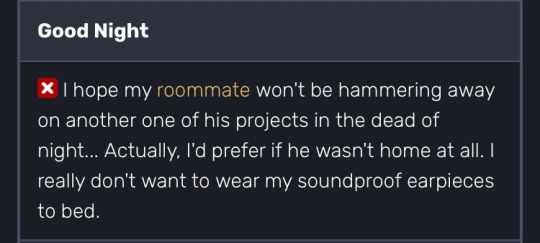

Alhaitham’s ‘good night’ voice line instantly serves as a contradiction to his character. It’s interesting, and telling, that Alhaitham, who is essentially Kaveh’s landlord, and mentions this within his fourth character story, alludes to Kaveh by using ‘roommate’ rather than ‘tenant’. ‘Landlord’ evokes a position of authority over the tenant, whereas ‘roommate’ indicates an equality between two people sharing a house – since it’s Alhaitham who advocates for the term ‘roommate’, it’s telling that, as opposed to what Kaveh believes, Alhaitham wants to establish equality between them.

In terms of what Alhaitham says in this voice line, it explicitly raises a contradiction in the form of a question: if Alhaitham is truly bothered by his roommate’s antics, why doesn’t he simply evict Kaveh?
This is relevant as this question is also posed when we initially meet Kaveh within the Archon Quest, as Kaveh states he dislikes Alhaitham’s personality, to which Alhaitham responds by saying if he bothers Kaveh so much, Kaveh always has the option to move out of the house – to which Kaveh perceives as a threat, only to then dismiss this as Alhaitham ‘changing the subject’, which seems to mean that this ‘threat’ is taken as baseless. As this isn’t called back to, this seems to be the case.


There is no real threat of eviction, and regardless of their disputes, Alhaitham ultimately gives Kaveh no ultimatum to move out. In fact, as discussed here (page 27), as we are meeting Alhaitham and Kaveh for the first time, Alhaitham allowing Kaveh to live with him contradicts his established character of living a life free of inconvenience. This instantly creates intrigue around his and Kaveh’s dynamic – who is Kaveh to Alhaitham for this exception to be made to Alhaitham’s peaceful way of life?
(An additional note of interest is that Alhaitham’s solution to the noise problem seems to be more uncomfortable than calling on Kaveh and telling him to stop his work. Alhaitham says that he’d rather not wear his noise-cancelling earpieces to bed, implying that he does so when noise is a problem at night. However, there’s no mention of Kaveh being stubborn when confronting this issue, which is why he takes to wearing his ear pieces, or any mention of confrontation at all. From this voice-line, it seems that Alhaitham avoids interaction by opting for the least comfortable option, which can be a contradiction to his character. As this is a rather brief voice-line, it’s difficult to ascertain why, but I like the idea that Kaveh is productive at night, and Alhaitham prefers not to impose on Kaveh’s work process – but this is more a headcanon than evidenced interpretation.)
Returning back to the contradiction within this voice-line, at a surface glance, this does appear to be a general complaint about Kaveh, and this can be found in Alhaitham’s lines about Kaveh, and also when discussing Tighnari. Alhaitham refers to Kaveh as ‘overly sensitive’, and ‘constantly making a fuss’.
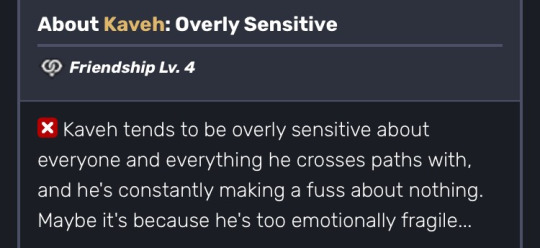
These can easily read solely as complaints, but when looking to the original CN translation, another interpretation can be found here. Alhaitham describes Kaveh as ‘caring’ or ‘tender’, which is exactly how Kaveh is described within the 3.6 special program (as per minimushiroom on twt), which can allude to how Kaveh is considerate to a fault, in that this serves as a detriment to himself.
This can be seen in Alhaitham’s other Kaveh-centred voice-line, in which he describes Kaveh buying keychains in order to provide meals for sick children, even though healthcare is free in Sumeru. Alhaitham clearly holds the view that this was a redundant action, as Kaveh, being in debt, most likely doesn’t have the money to spend on such investments that are, evidently, dubious.
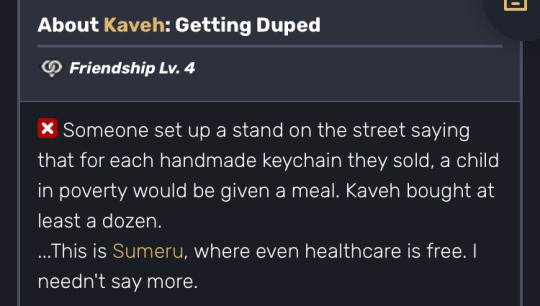
As Alhaitham provides a rational view here, this contrasts with Kaveh’s act of generosity fuelled by emotion – which highlights the contention Alhaitham has with Kaveh, in that Kaveh places himself in dangerous situations for the sake of others. However, as this can be perceived as a solely derisive line, this essential context is lacking, and can be easily misconstrued. (I think the EN translation here also coincides with this narrative, as minimushiroom notes that the original CN has Alhaitham refer to Kaveh’s sensitivity in a positive way, rather than contemptuously, as the English can be interpreted as.)
Kaveh, similarly, can be seen to complain about Alhaitham in his own voice-lines. This can be seen in the 'Good Morning' voice-line you've mentioned, where Kaveh complains about having to see Alhaitham in the morning, which 'ruins' his day. Additionally, Kaveh's voice-lines discussing Alhaitham refer to Alhaitham as ‘infuriating’ and not wanting to give Alhaitham the satisfaction of thanking him, despite Alhaitham helping him out. However, there is more nuance in these voice-lines than Kaveh simply ‘disliking’ Alhaitham, as this dislike is never stated - rather that he and Alhaitham have a difficult relationship in comparison to the ‘close’ friendship of their past.


Kaveh describes their relationship being a ‘mixed bag’, of both negatives and positives, as well as establishing a thorough understanding of Alhaitham, where other people may misinterpret Alhaitham as they ‘don’t know him well enough’. Additionally, Kaveh notes that he knows that Alhaitham can present himself in a more ‘likeable’ manner, but that Alhaitham refuses to do so, which refers to Kaveh’s contention with Alhaitham discussed within his character stories. This, in turn, generates curiosity, as it appears that Kaveh holds an in-depth knowledge of Alhaitham that the player isn’t privy to.
Referring back to Alhaitham’s ‘Good Night’ voiceline, the question raised is, if Alhaitham has a problem with Kaveh, why doesn’t he just evict Kaveh? And the answer can be found by digging further into Alhaitham’s character stories. Looking to Alhaitham’s fourth character story, it states that he is aware of the dissatisfaction Kaveh may have with their living arrangement but that ‘it matters not to him’.
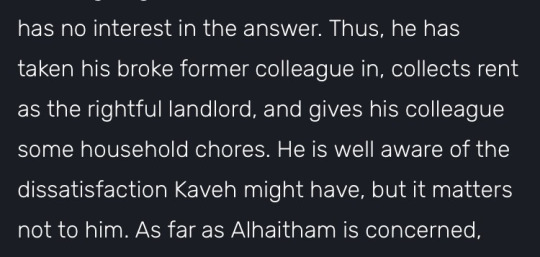
This means that he is aware that Kaveh may be unhappy with having to rely on someone else for a stable livelihood, something which his pride doesn’t naturally allow, but that this is also exacerbated due to their previous falling out and the current contentions Kaveh has with him.
At first, this can seem rather abrasive, which does fall in line with Alhaitham’s egoism as this doesn’t directly impact ‘the self’ (discussed further here), however, what immediately follows is Alhaitham’s belief that he and Kaveh are mirrors, in that his own perspective of the world will be enhanced - in the og CN, ‘completed’ -by Kaveh’s own world view.

The implication generated here with the explicit term ‘mirror’, is that, just as Alhaitham benefits from Kaveh, Kaveh, in turn, can benefit from Alhaitham. (As a side note, it is interesting then that the voice-lines in question can be seen to mirror each other – Kaveh mentions Alhaitham in ‘Good Morning’ whereas Alhaitham mentions Kaveh in ‘Good Night’.)
Returning back to Alhaitham’s character story, rather than merely reflecting each other philosophically speaking, I’d say that this also points to their respective progression as people, not just scholars.
To me, this is reminiscent of what Alhaitham says to Kaveh in A Parade of Providence – being ‘correct’, ultimately, doesn’t matter, as there is no ‘correct’ path in life, meaning that there is no ‘correct’ philosophy to shape and guide a person. Rather, Alhaitham asserts that, ultimately, their opposing philosophies are not the issue that exists between them.


The issue that does exist, then, can be surmised from Alhaitham’s actions during the event (discussed further here), in which he researches into Sachin to gauge his influence over Kaveh’s father journeying into the desert, with implicit hopes of providing closure for Kaveh, and potentially assuaging Kaveh’s guilt. This is a personal act with a personal motive; the underlying motive being concern, as opposed to an assertion of ‘correctness’.
In my opinion, I think Alhaitham’s actions during A Parade of Providence are a direct reference, and fulfilment, of Kaveh’s fifth character story. I’ve discussed here that the main reason for the ending of their friendship was them asserting the correctness of a philosophy over the other, and proposing one philosophy as the ‘solution’ to the other’s perceived flaws.
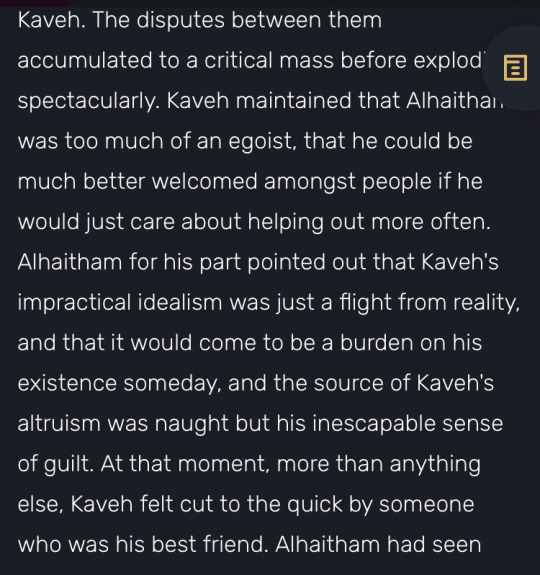

Here Alhaitham can be seen to use Kaveh’s past as the reason for his excessive altruism, implicitly referring to Kaveh’s guilt over being the supposed catalyst for his father’s demise. This final comment of Alhaitham’s appears to be the first time this has been mentioned between them, and it’s enough to be perceived as weaponisation – leading to Kaveh severing their friendship.
In A Parade of Providence, Alhaitham is shown to only have taken the role of commentator to research into Sachin, whose research we are told (by Kaveh), he has no explicit interest in, and it is heavily implied that the only reason he looked further into Sachin, was to prove to link between Sachin and Kaveh’s father. Alhaitham seems to want to absolve Kaveh of this past guilt in hopes that Kaveh will stop placing himself in the cycle of self-sabotage.
For me, when viewing this as a parallel, it highlights that Alhaitham’s motivation in speaking out during their days as students was out of concern for Kaveh, although while holding egoism as ultimately beneficial, and therefore perceivably ‘correct’. The ‘issue’ they’re currently debating is not expressly stated, and although it is unclear if Kaveh understands the implication (as discussed here), as ‘correctness’ has been overturned, there seems to be little left than the personal.
Relating this back to Alhaitham’s fourth character story, for me, Alhaitham referring to Kaveh as a mirror isn’t just referring to Kaveh as a scholar, but a person as a whole. As Alhaitham seeks to improve himself, personally, through Kaveh, it seems that he hopes to be able to benefit Kaveh in turn.
As for Kaveh’s complaints regarding Alhaitham, these can be contextualised within his own character stories. As Kaveh ultimately severed the friendship between him and Alhaitham, Alhaitham offering Kaveh to live with him, despite Kaveh revoking his previous understanding of Alhaitham (as discussed here, page 67), causes Kaveh to be overtly suspicious.
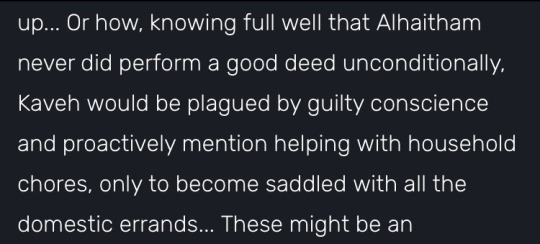
In Kaveh’s Old Sketchbook, it is mentioned that Kaveh believes there to be an ulterior motive for Alhaitham inviting him to share a house, as he believes that Alhaitham wouldn’t do something for someone else without an exchange.
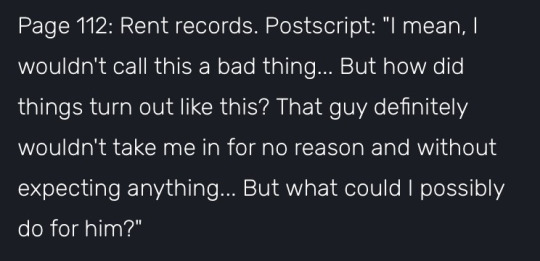
Kaveh, then, openly distrusts Alhaitham due to this unspoken motive, and although he takes on chores to ease his sense of guilt of being a perceived burden, a contention arises here. Due to their previously ended friendship, and with how Alhaitham hurt Kaveh, and how Kaveh may believe he hurt Alhaitham (discussed here), Kaveh sees no reason for Alhaitham to want him around – he treats their relationship as an exchange, asking what Alhaitham could possibly want for him.
Although Alhaitham views Kaveh as a mirror, and therefore, respects Kaveh’s perspectives, Kaveh can potentially view their opposing philosophies as a negative rather than a positive as he had done in the past (as discussed here), as it, perceivably, was what led to the end of their friendship. In this, Kaveh views Alhaitham as disparaging him and his views. As mentioned in his character story, he has no reservations in telling Alhaitham of his debt as Alhaitham has already seen through him in the past, and yet again, upon meeting at the tavern.
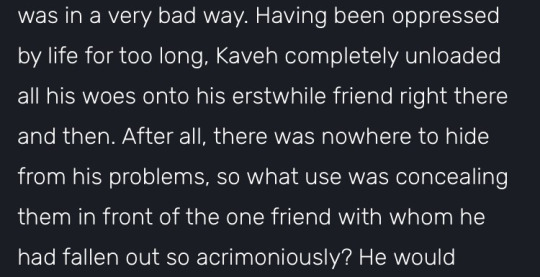
Although Alhaitham perceivably views him unfavourably, and his comments and complaints appear to propagate this interpretation, Alhaitham also seems to have no issue with keeping Kaveh around, and interacting with Kaveh, regardless of the problems Kaveh expressly has with him.
To Kaveh, it could be that as Alhaitham has already seen the worst of him, and appears to have no real issue with their stilted rapport, there is no point in donning a front and using niceties. He is open with his issues with Alhaitham, and, in turn, Alhaitham is open with him.
This appears to be a dual negative and positive for Kaveh, as he describes Alhaitham’s constancy as ‘the most unshakable part of one's past is a friend that will never change’. In this sense, his unsteady rapport with Alhaitham is reliable, and therefore, has no reason to change.

Clearly, there is a large disconnect between Alhaitham’s view of Kaveh and how Kaveh perceives Alhaitham’s view of him. As previously mentioned in the discussion of A Parade of Providence, there is an unspoken ‘issue’ between them, and this can be interpreted as dire misconceptions borne from miscommunication.
As discussed, Kaveh and Alhaitham reference each other a lot in their respective voice-lines and their character stories. This alone is enough to connect them, regardless of the cruciality of their mirror motif, as they are key figures of each other’s past, present, and seemingly, future. Despite this, it’s as you say, there’s a common perception to view them as mutually disliking each other, and, to me, this is based upon their first initial interaction, and the way they refer to each other in their own character stories and voice-lines.
It’s notable that Alhaitham refers to Kaveh in his voice-lines when Kaveh is not explicitly relevant, such as in his Good Night voice-line, and, most interestingly, when Alhaitham discusses Tighnari.

This could be because Alhaitham knows of Tighnari through Kaveh, but as this connection isn’t stated, it reads as Alhaitham mentioning Kaveh for no other reason than to complain about his perceived naivety regarding relations with others. But as this is a voice-line designated to discussing Tighnari, it’s interesting, and incredibly noticeable, that Alhaitham then discusses Kaveh instead. It’s similar to what Kaveh can be seen to do, and is observed to do by others, in relation to discussing Alhaitham.

When it comes to Kaveh, however, his complaining of Alhaitham can be seen to link with his process of dealing with troubles in his work. In his Hangout, he states that he takes his work to heart because he cares about it, which is expressed in the same quest in which Kaveh and the Traveller run into Alhaitham in the House of Daena (discussed further here, page 219).
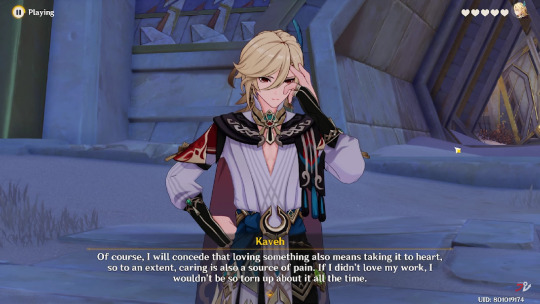
Drawing a parallel here can further contextualise Kaveh’s complaining of Alhaitham – if Kaveh truly disliked Alhaitham, there seems to be no reason for Alhaitham to remain so relevant to him, both in conversation, and in private thought. Additionally, Kaveh is described as an empathetic person, and when dealing with others, he is thusly seen to look for another perspective rather than act on his own subjective perspective.
Looking at his voice-line on Dori, for example, expresses his distaste for Dori pressuring him for Mora due to his debt, however, he also empathises with her, and states that he senses there must be a reason why Dori acts in such a way.

In contrast, this empathy can be perceived as missing in his treatment of Alhaitham, and therefore Kaveh complaining about Alhaitham can be perceived as blatant dislike – which contradicts Kaveh’s benevolence and empathy, which A Parade of Providence particularly stresses.
Kaveh’s treatment of Alhaitham can be seen as deliberately contradictory, as it can cause the player to question why Kaveh reacts in such a singular way to Alhaitham, just as why Alhaitham reacts in a singular way to Kaveh.
In reference to Alhaitham, whilst Alhaitham tends to complain about Kaveh in turn, his actions reveal him. He invites Kaveh to live with him, gives no eviction date, pays for Kaveh’s tabs willingly, (supposedly) buys wine as an apology, and goes out of his way to ensure dialogue with Kaveh – which contradicts his own character stories, in which he appears to favour solitude, and only greets those he considers his friends ‘with a nod or two’.

Moreover, Alhaitham is established as considering Kaveh a necessity to his ‘peaceful life’ he seeks to maintain (as discussed here), and can be seen to implicitly consider Kaveh one of his priorities within his Story Quest.
The idea that Alhaitham dislikes Kaveh seems to stem from Alhaitham being taken literally when voicing an opinion, or an issue, or simply joking, in reference to Kaveh – despite his character stories highlighting that Alhaitham often uses sarcasm in order to subvert expectations.

Alhaitham expressly states that he prefers to be seen as inscrutable, and unknown, by the general public, and uses subversion as a means to do so. In these character stories, Alhaitham openly encourages speculation of his own words.
Without this context, it seems easy to simplify Alhaitham to purely speaking factually when first addressing Kaveh in the Archon Quest – stating that having to explain things to Kaveh is ‘a nuisance’, and yet, it is overlooked that Alhaitham stays in the House of Daena, regardless, knowing Kaveh would find him again.
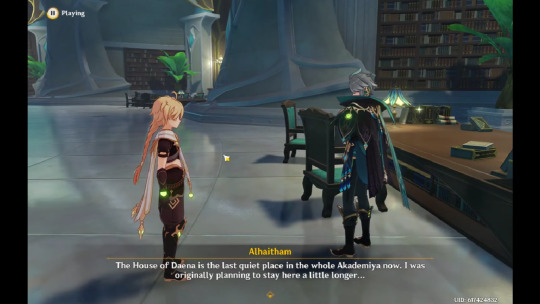
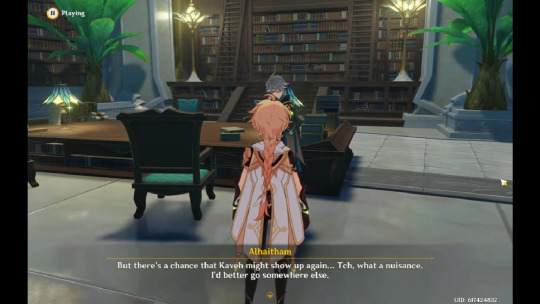
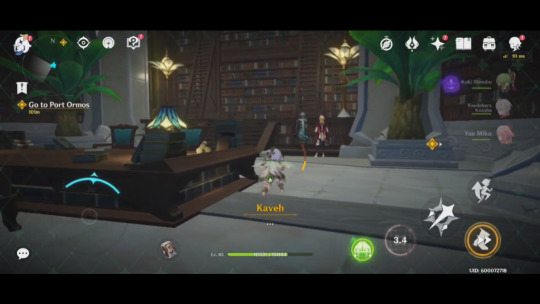
On the whole, in my opinion, Kaveh’s feelings towards Alhaitham cannot be simplified to ‘dislike’ as this is dually an inherent misunderstanding of his character, and of his and Alhaitham’s relationship, just as Alhaitham’s feelings towards Kaveh cannot be simplified to ‘dislike’ for this same reason.
In the beginning, Alhaitham and Kaveh are not supposed to be perceived as friendly, as Kaveh denies the association of ‘friends’, and Paimon describes them to the Traveller as ‘problematic’.

The reason for this is due to their character arcs being intertwined – the core issue is posed in Kaveh’s fifth character story, in that the question is raised if a compromise can be reached, if both sides of the mirror, can be balanced. At the beginning, they are entirely at odds, but even footing must be found.
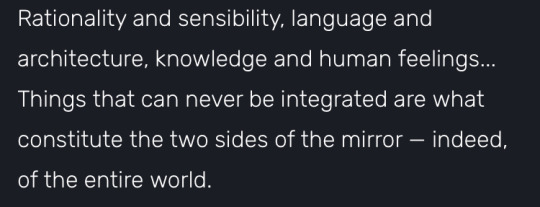
I’ve noticed a shift in online discourse after Cyno’s second story quest, as the progression in Alhaitham and Kaveh’s relationship is noticeable – deliberately, due to the flashback scene within their house (which I’ve discussed in detail here, page 122). To me, it’s more common to form the assumption that Alhaitham and Kaveh dislike each other in the Archon Quest, but with recent developments, and, hopefully, future ones, this perception is being overturned in online communities. Perhaps that’s just wishful thinking, but I’m still hopeful!
#haikaveh#kavetham#alhaitham#kaveh#genshin impact#thank you so much for your ask anon! it really ate away at my brain#haikaveh's writing is just so !?!?!? theres so many layers to peel back so a surface read of their relationship can be misconstrued as toxi#but ultimately i think these voice lines and details of their character stories are for people to question WHY they are Like That with#each other and it's one of the things i love about them that nothing is upfront or simple it really suits their themes so well#alhaitham constantly questions the world around him and flips language on its head and kaveh challenges the world with his ideals but works#with rigid principles of design and construction and he can't tell sarcasm from genuine praise which also adds to why he takes alhaitham's#words so personally... but this is improving now?? i am saying thank you cyno's second story quest <333#also the narrative that haikaveh can't stand each other seems to be more of a western thing from what i've seen online#and i think this is possibly due to the EN translation where the CN is less derisive or abrasive?#thank you to those who translate so the nuance is pointed out! <3
117 notes
·
View notes
Text

Dimitriverse here. And I'll use it as pretext to talk about Hopes. 'In this essay I will ☝️...'/j I must be one of the few - if not, the only one- (who's not on board with the anti-church propaganda |Just in case: I grew up in an atheist house| and not a Byleth hater either) who actually liked hopes because it supports and enhances houses narrative view (contrary to the common belief that it's the opposite).
Hopes shows a constant comparison between both games. And we know that this universe plays a lot with the parallels between different characters, and relationships. Both similarities and contrasts. Hopes is a contrast, seen from Shez's perspective.
It is established from the beginning that they only see the superficial positive qualities of the leaders, just like general tone presented of this game.
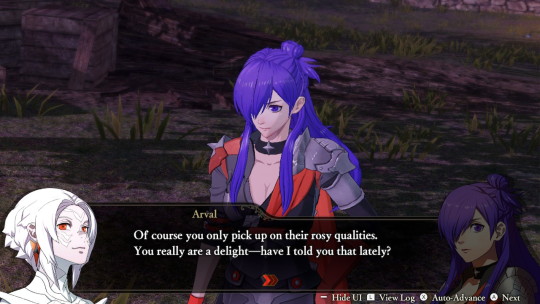
Here I'm going to focus mostly on AM's goal and its contrast in AG.
In AM Dimitri achieves redemption and benevolence through forgiveness and acceptance. These lessons he learns from Byleth - the teacher/ the guide/ the enlightened one (the class enlightened one is mea to alude that who have more knowledge and greater understanding of something, who also aludes to the original aspect of the game. Nirvana. The JP Byleth class) in an indirect way. Byleth in turn gets it from the goddess herself but also their life lessons/experience from GM, and the people surrounding them. WC is an important and crucial stage in Byleth's development, as is the interaction they have with the diverse students they tutor.
The role of Byleth goes beyond a mundane "self-insertion" of the player. Byleth is meant to be a bridge between that goddess and humans: the path to Nirvana.
Both forgiveness and acceptance are mentioned in the game but can go unnoticed due to the level of subtlety they are mentioned, but they are core elements in Buddhism such as compassion and wisdom that serve as a path to inner peace and freedom (specially for the leaders who rule over big factions of people), and breaks the chain/cycle of suffering, anger, revenge, resentment, among others.
And that reminds me of Arval's constant words: "the cycle of this world". What does Arval mean? The cycle of this world… said by an Agarthan "deity", whose only role in the game has been to generate constant conflicts between the inhabitants of Fodlan and beyond perhaps? so that they kill each other. I don't know Joe, something here smells weird -wink wink- (Not to mention it also emphasizes the qualities achieved through Nirvana)
It's Important to understand the importance of Forgiveness and everything involved in the act. Understanding forgiveness, as a spiritual practice, goes beyond simply letting go of resentment. It involves cultivating mindfulness and compassion towards oneself and others. Since the game has heavily references and basis from Buddhism you can grasp it from there (more than Christianity, I'm sure different faits have somewhat different or similar approach to some concepts). But need to mention the act is also applied from a physiological and neurological perspective (in case you're not much of a "fait" person like me. I still like the Buddhism take tho, from a philosophical standpoint💖).
Anyway, Dimitri AM manages to learn those lessons and is not just "to learn to live for himself", which is also important, but it is only possible to achieve it through the through the acts already mentioned: forgiveness, acceptance, compassion, etc. Acts that acts that are practiced externally towards others but which are mostly an act towards oneself. Compared to Dimitri AG where the path chosen is revenge.
Misfortune always dogs the steps of one who gives way to the desire for revenge.
Does he get the answers he thinks he wanted? Yes Did it satisfy him? A Dimitri fan knows it didn't. Can Dimitri's friends help him? No, because they're in a similar situation or under similar believes, and this game displayed it.
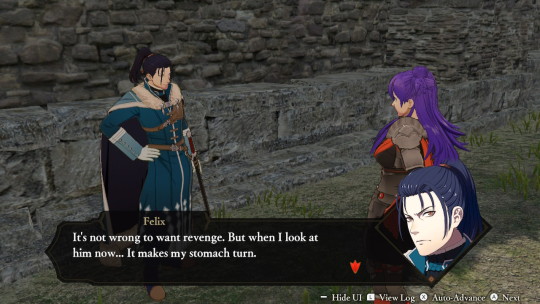
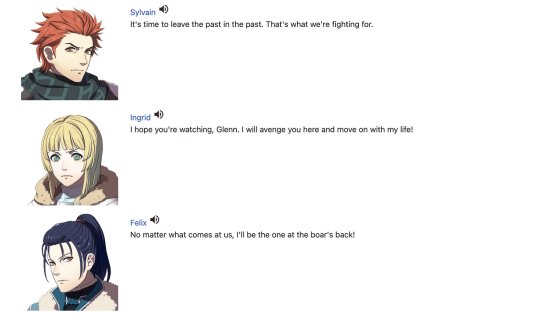
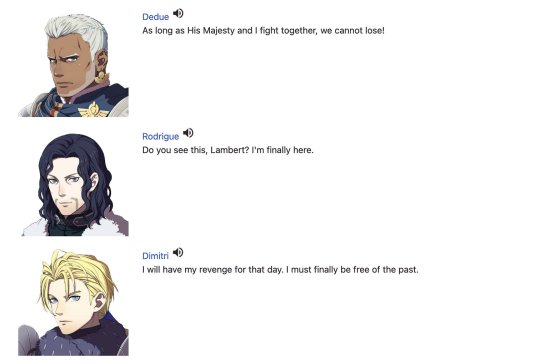
Sopilers: No, they won't get anything from getting revenge and certainly doesn't help to move on. Much less Dimitri, who's mental health has only been addressed at the end of a couple of supports. Is Shez a bad person? No! but they help no one and just goes along with whatever the leader says. Is Arval/Epimenides a bad entity? This is where I think, the original concept of the game is applied, the one mentioning. There's no good or bad, only a matter of perspective. But of course, that's something arguable and extense that deserves its own analysis.
At the end of all 3 routes, the war continues (despite having finished off Thales in AG) because the cycle continues. The cycle of anger, of suffering, of revenge, of prejudice, etc. And in my opinion, I think that's beautiful (the comparison, I mean). Thanks for coming to my Ted talk
#Long post#fodlan ramblings and analysis#thoughts on games#fire emblem 3 houses#fire emblem warriors 3 hopes#dimitri alexandre blaiddyd#fe3h#few3h#holy kingdom of faerghus#On the other hand#I think my Dimitri paint needs some fixing >__>#artists on tumblr#Disclaimer: i am not an expert in Buddhism principles so take what I said with a grain of salt
94 notes
·
View notes
Text
I get the impression that the Good Omens fans rallying for season 3 pre-production to resume don't realise that Neil Gaiman's production company, The Blank Corporation, is co-producing it. There has been no suggestion that this will change. How far is he really going to "step back" while that's the case?
I understand these things are complicated and imperfect. But some fans seem way too willing to accept the most superficial reduction in his involvement before washing their hands of concerns about supporting a sexual predator. It's really upsetting to see.
#good omens 3#neil gaiman#personally i'm over it#he can't “step back” far enough as far as i'm concerned#but it's frustrating to see those who draw the line somewhere else (which i'm not opposed to in principle) demand so little#while claiming to care#this is obviously a hard choice for some people so you have to decide what kind of person you are#i know it's hard#but it's important to reflect on this
68 notes
·
View notes
Text
Thinkin about the idea of Astarion being protective over Wyll, especially when it comes to Mizora. Mizora shows up to talk to Wyll and the whole time Astarion is glaring at her like he's trying to burn a hole through her head with his eyes, all the while slowly drifting closer to Wyll. The first time it happens Wyll is a little bit bewildered, he doesn't hate it certainly but he's so used to being the protector, he's not used to being protected, he doesn't quite know what to do with himself. Eventually Astarion is slowly drifting his way into Wyll's personal space and Wyll doesn't pull away. After the first few times this happens he even starts to lean into it when Astarion starts inching into his personal space.
It's quite comforting, knowing he's got Astarion by his side, that he doesn't have to face this alone - he's not facing it alone - just the fact that Astarion there is a comfort to him. It's also quite validating, seeing Astarion so angry on his behalf. And maybe, perhaps, it's a little bit endearing. Certainly Astarion cuts a pretty intimidating figure, it's hard to deny that, though there's part of Wyll that can't help but be reminded of an angry stray cat, puffing up and growling at whoever got too close. More than once he has to stifle a grin at the mental image.
#wyll ravengard#astarion#astarion ancunin#wyllstarion#bloodfrontier#bloodpact#i think once Astarion REALLY cares about someone he starts to get protective#also i think Wyll deserves to have someone get protective over him#he deserves to have someone wholl get REALLY FUCKING ANGRY on his behalf#Wyll deserves the world honestly#astarion and karlach form the Wyll Ravengard Protection Squad#yes they know he can typically handle himself just fine but its not ABOUT that - its about THE PRINCIPLE OF THE THING#anyway. im normal#bg3#baldur's gate 3
374 notes
·
View notes